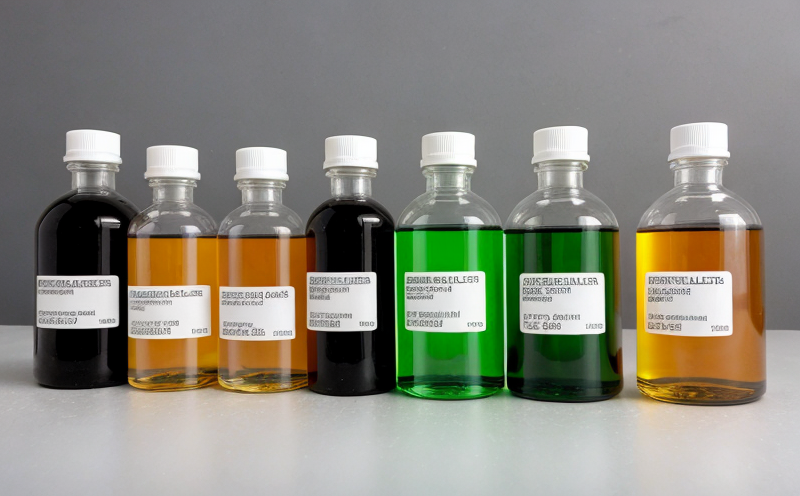Leachables Testing in Pen Injector Materials
In today's medical device industry, ensuring patient safety and compliance with regulatory standards is paramount. Pen injectors are critical components of many life-saving treatments, and their materials must be rigorously tested to prevent potential adverse effects from leachable substances. Leachables testing involves the identification and quantification of chemicals that may migrate into a product during its lifecycle due to contact with the device.
The process begins with thorough sample preparation, where the pen injector is subjected to controlled conditions designed to simulate real-world use scenarios. This includes exposure to various solvents and temperatures, which can elicit leachables from different polymer types, coatings, or other components. Common materials in pen injectors include polyethylene terephthalate (PET), polycarbonate (PC), and silicone, each presenting unique challenges due to their chemical properties.
The testing methodology typically involves extraction with solvents such as water, ethanol, methanol, acetonitrile, and phosphate-buffered saline. The extracts are then analyzed using a range of analytical techniques including high-performance liquid chromatography (HPLC), gas chromatography-mass spectrometry (GC-MS), and inductively coupled plasma mass spectrometry (ICP-MS). These methods provide precise quantification and identification of the leachables, ensuring that no harmful substances are present in concentrations above acceptable limits.
Once the extracts have been analyzed, a detailed report is generated. This report includes a comprehensive list of identified compounds along with their respective concentrations. It also provides insights into potential risks associated with these findings and recommendations for material selection or process improvements to mitigate any identified issues. Regulatory compliance plays a crucial role in this testing process, aligning with standards such as ISO 10993-12:2018 and USP to ensure that the pen injector is safe for its intended use.
The importance of leachables testing cannot be overstated. Even trace amounts of certain chemicals can have significant health impacts, especially when patients are using medical devices on a regular basis. By conducting thorough leachables tests, manufacturers can identify and address potential risks early in the product development lifecycle, thereby enhancing patient safety.
In summary, leachables testing in pen injector materials is an essential step in ensuring that these critical components meet stringent quality standards and regulatory requirements. The process involves meticulous sample preparation, controlled extraction conditions, advanced analytical techniques, and rigorous reporting protocols to provide comprehensive insights into the chemical composition of the materials.
Why It Matters
The significance of leachables testing in pen injector materials lies in its direct impact on patient safety. Pen injectors, as part of medical devices used for administering medications, are subject to continuous contact with the human body over extended periods. Any leachable substances that find their way into these devices could potentially cause adverse effects ranging from mild irritation to severe health issues.
For quality managers and compliance officers, ensuring adherence to regulatory standards is non-negotiable. Leachables testing helps in meeting stringent requirements set forth by organizations such as the FDA (US Food and Drug Administration) and EU regulators. Compliance with these guidelines not only protects patients but also safeguards manufacturers against legal challenges and reputational damage.
R&D engineers benefit greatly from this testing process, as it provides critical data that can inform decisions regarding material selection and manufacturing processes. By identifying potential risks early in the development cycle, they can make informed adjustments to improve product safety and efficacy.
For procurement teams, leachables testing ensures that only high-quality materials are sourced for production. This reduces the risk of substandard components entering the supply chain, which could compromise the integrity of the final product. Procurement professionals thus play a vital role in upholding the standards set by rigorous testing protocols.
In conclusion, leachables testing is crucial for maintaining high levels of patient safety and ensuring regulatory compliance. It serves as a cornerstone in the quality assurance process, providing invaluable data that contributes to safer medical devices and enhanced public health.
Applied Standards
The leachables testing process adheres strictly to internationally recognized standards designed to ensure product safety and compliance with regulatory requirements. Key standards include:
- ISO 10993-12:2018 – This standard provides guidance on the evaluation of leachables from medical devices, including the selection of appropriate extraction solvents and analytical methods.
- USP – The United States Pharmacopeia (USP) chapter 788 outlines procedures for the evaluation and control of extractables and leachables in pharmaceutical products and medical devices.
Besides these, other relevant standards may include:
- EN ISO 10993-6:2009 – European standard for the biocompatibility of medical devices.
- ASTM E2586-16 – American Society for Testing and Materials standard for extractables testing in medical devices.
The adherence to these standards ensures that the testing process is consistent, reproducible, and meets the highest quality benchmarks. This alignment with recognized international guidelines further reinforces trust in the reliability of the test results.
Customer Impact and Satisfaction
The impact of rigorous leachables testing on customer satisfaction is profound. By ensuring that pen injector materials are free from harmful leachables, manufacturers can significantly enhance product reliability and safety. This translates directly into higher levels of trust among healthcare providers and patients.
Quality managers and compliance officers play a pivotal role in maintaining these standards, knowing full well the importance of regulatory compliance. They find peace of mind knowing that their products meet or exceed all necessary requirements, thereby reducing the risk of recalls and adverse event reports.
R&D engineers can leverage the insights gained from leachables testing to innovate and refine product designs, leading to more effective and safer medical devices. This innovation not only benefits end-users but also contributes positively to the broader healthcare industry.
For procurement teams, ensuring that they source materials from suppliers who adhere to stringent testing protocols is crucial. By doing so, they contribute to the overall quality of the final product, which in turn enhances customer satisfaction and loyalty.
In summary, leachables testing ensures that pen injectors are safe, reliable, and compliant with all relevant standards. This not only meets regulatory expectations but also sets a benchmark for excellence, ultimately leading to higher levels of customer satisfaction across the industry.





